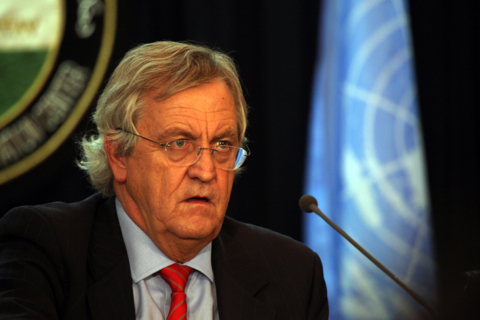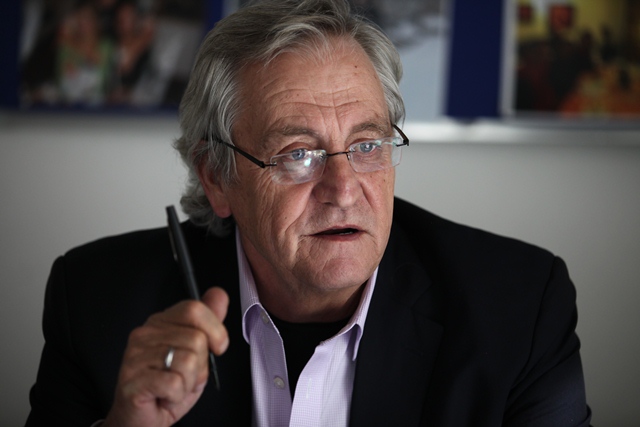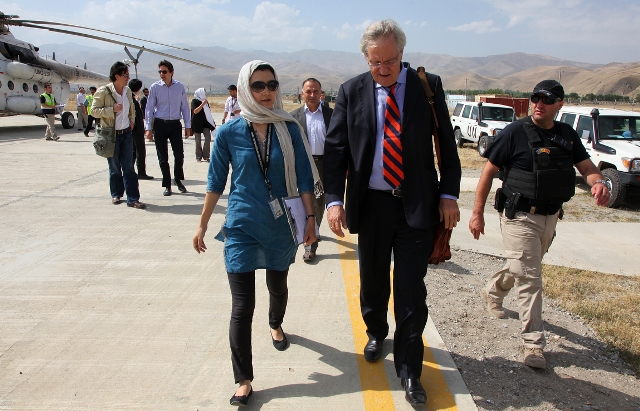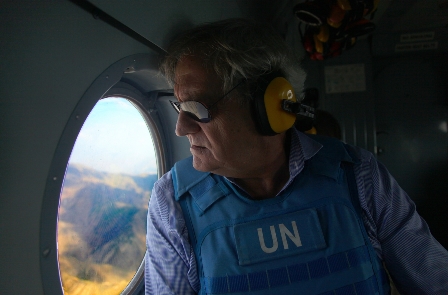KABUL - Afghanistan is slated to hold Presidential elections on 5 April 2014. In line with its mandate from the United Nations Security Council and at the request of the Afghan authorities, the UN Assistance Mission in Afghanistan (UNAMA) is charged with supporting the 2014 poll.
The election will mark a transfer of power from one elected government to another – the first time this has happened in Afghanistan’s history. One of the key UNAMA officials involved in this activity is the Secretary-General’s Deputy Special Representative, Nicholas Haysom.His experience prior to his appointment in March 2012 includes serving in the Executive Office of Secretary-General Ban Ki-moon and the UN Assistance Mission for Iraq.
Prior to his UN appointment in Baghdad, he worked on constitutional reform, electoral reform, conflict resolution, good governance, and democracy-strengthening in several countries in Africa and Asia. He was also closely involved in the constitutional negotiations leading up to the interim and final Constitutions in South Africa, serving as Chief Legal Adviser throughout Nelson Mandela’s presidency until 1999 and continuing to work with Mr. Mandela on his private peace initiatives up to 2002.
UNAMA Quarterly spoke with Mr. Haysom about the upcoming elections.
UNAMA: From a historical perspective and in light of your own experiences, just how important is the election for the future of Afghanistan?
Haysom: The forthcoming election is critical for the future of the country. It offers an opportunity to renew the legitimacy of the government, which is very important. But this is not only important for Afghans themselves, but also, for Afghanistan’s relationship with the rest of the world. Afghanistan, for various reasons, still needs continued support, both financial and otherwise, from the outside world. If the elections work out badly, it will undermine the level of international support for Afghanistan which, in turn, will threaten the viability of government, the economy and the security forces.
UNAMA: How are the preparations going for the elections?
Haysom: The good news, as far as the elections are concerned, is that Afghanistan has never been better prepared for elections and certainly as compared to previous election cycles in 2004/05 or 2009/10. So we can take encouragement from that. We follow closely the extent of electoral preparations. I can assure people that not much more could be done to be better technically prepared. There are still significant challenges ahead, but, at the technical level, the preparations are well-advanced.
UNAMA: Is there any truth to rumours that the elections could be delayed?
Haysom: The principal stakeholders have committed to holding elections on the due date [5 April 2014] – that is what the constitution envisages. We are aware that some people have raised the issue of voter station accessibility at that time of the year in same districts – especially in Badakshan and Central Highlands. On the other hand, it is a favourable time – security wise. We would support a firm commitment to the electoral timetable and the Afghan Constitution. That provides some certainty also for Afghans themselves.
UNAMA: There are reports that the UN will monitor the elections. What exactly is the role of UNAMA in relation to the elections?
Haysom: The UN has played a significant role in providing capacity building support to the people who are actually administering the elections, who are the Afghans themselves. So the UN is not itself conducting the elections, as it were on behalf of the Afghans. It is helping Afghans, at their request, to conduct the elections themselves.
The UN has a principled approach to observing elections: once it is assisting in the conduct of elections, it will not monitor these same elections as well. There is a conflict of interest between helping conduct the elections and being the body which is monitoring and judging how well these elections are conducted.
It is best to separate those roles. We expect the Afghans themselves to monitor the elections, supplemented by international observers. But, primarily, it will be domestic observers from Afghanistan who will bear most of the responsibility as the number of international observers are few, and even less will actually go to insecure areas.
So the UN will not be officially observing. We will not however be invisible. We will be closely following events so as to perform our other functions including offering “good offices” should problems arise and coordinating international assistance. In regard to certifying that the elections are free and fair – that is not going to be our role for the very same reason.
UNAMA: What are the key challenges for the smooth holding of elections?
Haysom: I think we all acknowledge that the security situation in the country at the time of the elections will be quite critical. That is for two reasons: A major concern is that the elections are held in a way in which they are accessible to all Afghans. In other words, conducted and inclusive in a manner that Afghans feel free to go out and vote.
The importance of inclusivity in the conduct of elections also means that all parts of the country, all groups in the country, must have an equal opportunity to come out and vote. So providing security will be an important aspect of conducting the elections in an inclusive, credible way – which in turn makes a legitimate outcome.
Another challenge is to ensure that the administration of the voting process, together with the proper observation of the elections, are conducted so as to prevent fraud. We know that there was widespread practice of fraud in the last election. Afghans are entitled to know that when they vote, firstly, their vote will count. Secondly, that their vote will not be outweighed by fraudulent votes and thirdly, that their votes will not be stolen.
For that reason we are doing whatever we can to advise those responsible for administering the elections to do so in a way which combats fraud, especially ballot box stuffing.
UNAMA: What should be done to make the elections inclusive and transparent?
Haysom: We think that public outreach is important. We think there needs to be a proper public education campaign which reaches out to all parts of the countryside, helping people to appreciate the value of voting, understanding how to go about voting, reassuring them that they will be safe on election day and reassuring them that their vote will count – that will be important.
It will also be vitally important for the IEC and IECC, the election management bodies, to work in an independent and transparent way. Regarding the registration of candidates, there were suggestions that the adjudication of complaints was not done in an open and transparent way. I think the authorities have moved to deal with the criticisms and to review the way they deal with complaints so as to do this in a way which meets the standards of transparency.
UNAMA: How do you assess the progress of the Independent Election Commission (IEC) in implementing its plan to ensure fraud mitigation, build the capacity of its staff and raise awareness of participation for voters?
Haysom: So far they are implementing it in accordance with the law and the election timetable. The law provides relatively detailed provisions regarding the architecture and operation of the election management body. As far as we can tell, they are pretty far advanced in the preparations and arrangements for conducting not only the first round but a possible the second round of the vote. This includes the training of staff and implementing a public education campaign.
The election authorities are attempting to address those aspects which will strengthen transparency and combat fraud. They are doing so in regard to how the votes will be counted, how the ballot boxes will be moved and secured. Both monitors and Party agents – the representatives of those who are contesting the elections – will have access to all stages and events in the electoral process in every place where voting takes place. So we are hoping that the conduct of the elections will be a lot better than the last time.
UNAMA: How satisfied you are with the overall voter registration process, particularly regarding women’s participation?
Haysom: The voter registration top-up exercise has seen the registration of over three million people who have come of age, have lost or were not issued cards in previous registration processes. The exercise is still continuing in the provincial capitals, although it is now completed at the district level.
Thirty four per cent of those who have registered are women. We know that in previous elections it has been a bit higher, but all things considered, I think that the exercise is being conducted properly, and with very few security incidents.
The number of people who have come out to register is estimated at 78 per cent of the maximum number that could have registered. Maybe we can even make 100 per cent by April. We would like to have seen a higher percentage of women register. When the registration exercise started the figure was under 20 per cent, so there has been some catch-up in regard to registration of women voters.
UNAMA: Given your past experience, what would be your advice to the Afghan authorities to ensure a level-playing field for all candidates?
Haysom: As regards a level playing field for candidates – the most important restrictions are those restricting access to government resources or obtaining any form of official support which is not offered to all candidates equally. The people who have the most important role in combating fraud are the candidates themselves, and they should send a clear signal to their supporters that they want the elections to be peaceful and that they do not want to see it ruined by fraud.
UNAMA: One of the key challenges for the holding of the elections is security. It may further deteriorate given the stated goal by anti-government elements to disrupt the polls. How can their threats be diminished, and what would be your message for those opposed to the polls?
Haysom: During the period of voter registration we have seen very little violence directed at this exercise. So, at this point, there has been no indication that there would be an effective campaign of violence against the elections and election officials. However, this may change. To those who may disrupt it, we would only emphasize that it is a fundamental right of Afghans to make choices about their future. Ordinary people going out to vote can never be considered a legitimate military target. It is clear in international law that ordinary people going out to vote are civilians and to deliberately attack civilians is a war crime.
UNAMA: What is the role of international community in the upcoming elections?
Haysom: In the first instance, it is to support the Afghan authorities in conducting proper, fair and credible elections. The international community has an important role in supporting the Afghans in this election, which can mean technical advice and it can mean financial support. There has been considerable financial support offered to the IEC and the ECC to conduct the best election that can be conducted under the circumstances. In the future, Afghan authorities are going to have to be increasingly self-reliant in administering their elections, so everybody has an interest in ensuring that these elections are competently Afghan-managed and -run.
UNAMA: If the elections do not turn out to be inclusive and transparent, what reaction could be expected from the international community?
Haysom: The international community will look to see how Afghans respond to the elections results. The best outcome would be one that satisfies Afghans rather than one that satisfies the international community. But I need to say that if the international community is of the view that the elections were improperly conducted and the new government is not legitimate as a result, it will certainly impact on the level of development aid for Afghanistan. Legislatures in donor countries will simply divert it to other countries in need of development assistance or which are recovering from conflict (Mali, Syria).
UNAMA: What is your message for the people of Afghanistan regarding the upcoming elections?
Haysom: I would just emphasize that the right to vote is a very important and fundamental right that all Afghans have and they should exercise it. Considerable sacrifices have been made to ensure that they can exercise this right. It is their opportunity to shape the future and to determine their own destiny, and we would encourage them to make the best use of that opportunity.
[This interview was originally published in the winter edition of "United Nations-Afghanistan Quarterly" 2013.]









